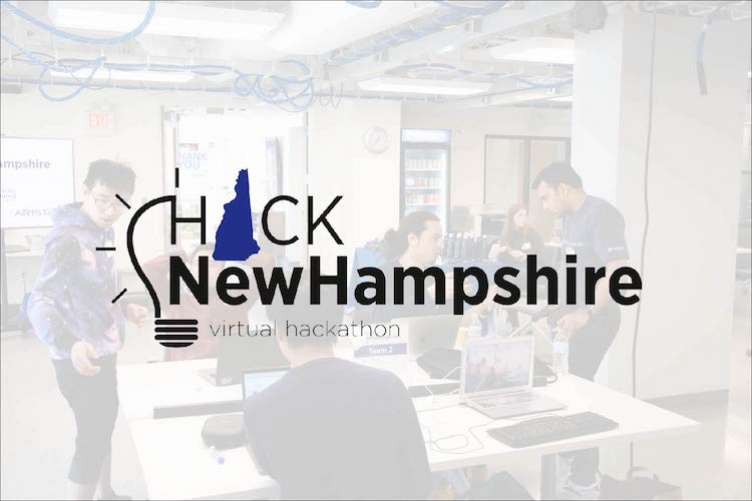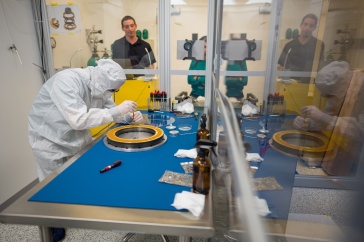
As the world marked a truly extraordinary year in a pandemic, the UNH InterOperability Lab (UNH-IOL) and the Peter T. Paul Entrepreneurship Center (ECenter) rallied to bring a little normalcy to UNH life with their annual hackathon. The innovative 24-hour event was changed to be entirely virtual and ended up with a higher number of student participants than ever before.
A total of eight teams participated March 27-28 to work together to solve the problem of misinformation in our state. Solutions ranged from search engine reliable source tracking, educating the public through art, community and creativity, and an AI algorithm. A panel of judges consisting of industry leaders and UNH faculty and staff rated the hackers in the categories of “best working product” and “best creative impact.” An overall prize for “best total package” went to the highest scoring team in either category. Prize amounts totaled $3,200, thanks to our hosting sponsors.
New Hampshire’s Liberty Mutual, Bottomline Technologies, and Arista Networks sponsored the event for the third year in a row. More than 20 undergraduate students from freshmen to grad students representing the College of Engineering and Physical Sciences (CEPS), Paul College of Business and Economics (PAUL), College of Life Sciences and Agriculture (COLSA), and Graduate School (GRAD) participated.
“This was the first hackathon I've ever participated in and I had a really great time,” said Christian Baduria ‘23, a computer science major in CEPS. “My partner and I both had programming experience, but we decided to go for the creative option, which gave us an entirely new perspective on the problem and our approach for solving it. Overall, I had a really great time exercising my critical thinking skills and I am looking forward to next year's hackathon.”
Read on to learn more about the amazing students and teams who participated and the solutions they created with this year’s challenge, “Create a Solution Which Helps Curb the Issue of Misinformation in our Everyday Lives.”
“With the hackathon being virtual, it was a slightly different experience than my two previous years of participating,” said Rachael Martinez ‘22, a mechanical engineering major in CEPS. “My team was still able to brainstorm ideas and combine our code just as well as we would've in person. We ended up winning the best working product category and it was great to be able to present from my room.”
BEST TOTAL PACKAGE
Mindful Bias by Kaitlin Phair ‘24 (COLSA), Tino Duche ‘24 (COLSA), and Salome Salgado ‘23 (COLSA)
Through greater focus on the younger generations, Mindful Bias works to change and expand our mindsets starting small. The program would take the form of a teachable curriculum for sixth through eighth graders to teach that bias is normal, but fact-checking yourself is necessary. With the use of community leaders like reporters, speakers, and professionals, information can be brought to schools directly much like the D.A.R.E. program. Speakers would share personal stories and identify skills they use for identifying bias in their own lives. The format would be a mix of videos, speeches and activities for the students to participate in.
BEST WORKING PRODUCT
Beacon by Cornelius Plomp ‘22 (CEPS), Nick Kahn (GRAD), Rachael Martinez ‘22 (CEPS), and Spencer Janelle ‘22 (CEPS)
Beacon wants to target misinformation campaigns early on by showing unbiased information first. In a general survey of 50 NH residents, the results found that the majority of citizens got their news from Google search engines and from friends and family members. Generally, most people tend to have the most trust in Google and the least amount in Facebook. Beacon itself would offer a combination of crowdsourcing and reliable resources for finding desired information. The application would work through a search engine with a series of pop-ups to indicate the trustworthiness of the article. The scores are through the votes of other web users, which is an easier way for regular citizens to contribute.
BEST CREATIVE IMPACT
Know the Facts by Daisy Burns ‘24 (PAUL), Jessica Nelson ‘21 (PAUL), and Jason Plant ‘23 (PAUL)
Attempting to attack threats like fake news, disinformation, logical fallacies, and poor data, Know the Facts is an all in one app that works to identify and educate against misinformation. Specifically, it targets NH industries under the most scrutiny like real estate, politics, and job searches. Features would include videos from industry experts and information from specifically primary sources. The interface of the app would be divided into categories, each accompanied by a video from an industry professional and additional sources. It remains more sustainable over fact-checkers because all sources are already of high educational value.
Hoax Buster by Bhavya Wadhwa ‘21 (CEPS) and Vinayak Chaturvedi ‘21 (CEPS)
Hoax Buster attempts to attack misinformation in a series of two phases, starting with detection through machine learning followed by broadcasting it on the internet as public knowledge. The framework of the application itself would be divided into the two stages beginning with data gathering, classification, and testing. Then, results are displayed on the web app with the hopes of creating a web plugin for the future. The dashboard of the app itself would include a simplistic layout for easy accessibility, with buttons like train, predict, and scrape.
ArtAFact New Hampshire by Madison McEahern ‘23 (COLSA) and Grace Higgins ‘23 (COLSA)
Through art, community, and creativity, ArtAFact works to educate communities that can become bogged down by excessive misinformation. The solution itself would include a space where locals can come visit to discuss with others and raise their social awareness. As an incentive for visiting, there would be frequent raffle prizes to local businesses. To tie in art, artwork for artists and UNH students would be displayed along with topics of the month up for discussion. A QR code would also be tagged next to each piece of art that includes more information and reliable sources.
Hogwash Eliminator by Amarta Kumari ‘21 (CEPS), Nitin Sharma ‘21 (CEPS), Mohammad Shafeul Wara (GRAD)
By stopping misinformation at the source, the Hogwash Eliminator works to address digital and news media directly. It was found that it’s generally difficult to eliminate online because it’s incentivized, tedious, and negative among several other factors. Instead of simply creating a site where a URL could be checked to be deemed as misinformed or not, instead, the Eliminator works to limit sharing, prevent hits, identify problems areas, then report it. Physically, it would be available as a browser extension. Digital coins are awarded as additional incentives and can be redeemed for real money rewards.
Combating Misinformation with Standardized AI Algorithms by Christian Baduria ‘23 (CEPS) and Kate Keefe ‘24 (CEPS)
To begin combating the threat of misinformation, they would begin by creating a new standards organization that would filter out fabricated information. The organization would oversee media networks as they would need to comply to the standards listed. Of the categories tackled, one in particular would be deep fakes which is used to fabricate events or images. The AI themselves would be able to identify these by identifying flaws, such as flickering around edges or poor lip synching. Another duty of the AI would be to analyze headlines for over exaggeration and relevancy. The organization plans to root out misinformation from its source by establishing a new wave of standards.
Factex by Ashlynn Hatch ‘24 (PAUL), Michelle Lee ‘22 (CEPS), and Rachel Poston ‘24 (PAUL)
In order to deal with the overwhelming amount of information coming from so many different sources, Factex specifically targets the bias of a source aligned with one’s views. This allows for people to question their beliefs at a deeper level. It’s user-friendly and available as both a web extension or a downloadable app. To use, the user would paste their link into the program and a popup brings suggested links with similarly topiced articles. Factex prioritizes independent user thinking and the power of choice over the media you are consuming. With 20% of New Hampshire identifying as independent voters, users can make an informed decision by combating fake news through the app.



















































